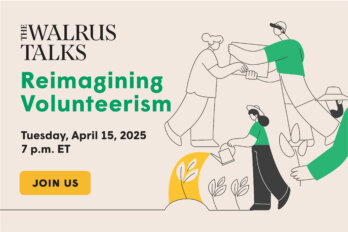Author Cherie Dimaline spoke at The Walrus Talks Survival, which took place on November 20 in Montreal.
You can watch all The Walrus Talks speakers from this event here: The Walrus Talks Survival on YouTube
Aaniin boozhoo
My name is Cherie Dimaline, but the old women in my community have given me a different name and that is, She Listens To Her People. It’s so that I can remember who I am and what my job is, and that is to carry stories. I belong to the rolling white sands around the Southern Georgian Bay and to my grandmothers who came there from the Red River, from German Island, and from what was known as Indian territory down into Wisconsin. I belong to the people I am charged with listening to.
The last time I was asked to give a Walrus speech, the topic was success. And in thinking about this one on survival, it occurred to me that they were almost the same thing in my mind. As an Indigenous person, survival is success. And sometimes that can be uplifting and other times that’s kind of depressing. Is that the best we can hope for, just survival? So I needed to understand just what I meant by survival. Did I mean breathing, being allowed to participate in life as a human, the mere act of being alive? No, that wasn’t it. When I think about survival, I think about the question that brought my community through three forced relocations to our present settlement. The question that ensured my ancestors, my grandparents and my parents gave me everything I would need to thrive as both a person who, by my definition, participates in life and as a Métis woman. That question being, who do we want to be at the moment of our survival? When we arrive at survival, who exactly are we going to be that ensures the success of that initial achievement?
In writing my book, The Marrow Thieves, and now working on the television series, I was telling story from inside an apocalypse. And I could do this with absolute certainty in its viability because as Indigenous people, we have already survived the apocalypse. I was writing dystopian future based on a dystopian past. It’s basically the story of the reemergence of residential schools built to hold an experiment on Indigenous people to study and extract their ability to dream, even in the midst of terror. It is the very story of how you survive by carrying everything that you need with you, within the stories you tell, the people you fight alongside, the ways you mourn and the ways you celebrate. And this book is a prayer for everything we have been and all the ways we continue on. And so even dystopian in tone, it’s very hopeful.
When I wrote my new book, Empire of Wild, I wanted to address many issues, resource extraction, missing and murdered Indigenous women and girls, land claims, rights erasure, and it revolves around a creature from Métis communities, the Rougarou. It asks the question, what happens when colonization looks away from our land and our children and what happens when it comes for our gods? And what are the ways in which they will resist?
More than anything though, I wanted to talk about the heaviest weight that we carry, the absolute heft of beauty and joy. The burden we can’t put down for even a moment because it’s so intricately tied to our struggle and we cannot live without them. It is a celebration of the feat of being able to bring with us the ability to laugh and love each other and bring our whole hearts into the work of ceremony and struggle, and doing that through our own worldview and on our own terms. Because survival is only truly successful when we can see with our own eyes and measure with our own tools, who and what we are. This is true resistance. Anything else is just assimilation and breathing, not real survival at all. Instead, we survive as a people so that we may live as a people.
And I’m often confronted by people who really want to share their opinions with me on Indigenous people in issues, thanks social media. They offer up what they call facts on Indigenous poverty, addiction, and corruption, but what is missing from any of this thought is a rigour, the understanding that if your community was in the midst of a fight for survival, one that had been going on for over 400 years, you might just see more broken veterans on the street as well. You might just find those fighting are angry, and disillusioned, and sometimes in need of support. They have this impression that we need to get over something that happened hundreds of years ago to which, of course, I ask when exactly they assume it ever ended. If we live in a post-colonial world, when and where exactly was the finish line between ongoing and post? I really think we probably should have been invited to that after party.
And so then this too enters the narrative when we talk about survival, the most basic understanding that we exist, and thrive, and struggle, and triumph, and fall within an ongoing state of oppression. Our survival is every day, every minute right now. And how can the world at this moment of crisis and potential destruction learn from our struggle? Let’s consider a scenario.
Let’s assume for a moment that we were all on a boat that is very clearly falling apart. The engine has stopped and is billowing smoke. The rivets are loose and pinging to the bottom of the hull like popcorn. We’re taking on water in fate-sealing amounts. So what do we do? We turn to the engineers that built the failing vessel and we ask them, “Can you secure our survival?” Well, they only have this design, this failing design that has brought us to this point. Instead, maybe we should turn to those passengers, few as they have become since we have forgotten to provide them with, oh, let’s say, clean drinking water. We turn to them who understand the sea that we are sinking into, those who have the knowledge to navigate the waters and feed us from them, those who know exactly how to survive every day, every minute right now.
At some point we might want to consider the option that can do the dual work of allowing our veterans a moment of peace away from the constant fight and one that brings us all back to shore, turning to Indigenous knowledge as a way forward. And what I’m suggesting is not staggering. It’s not an impossibility. It begins with listening to those who have answers. It begins with allowing people to live on their own lands and take over the steering wheel for a bit, at least when it comes to their own paths out from underneath oppressive and racist legislation. It means understanding that, like our stories, we need to look back and mourn, to look forward with hope, to resist on our own terms and celebrate all the beauty in the struggle. Because when we are out there on the sea together at that moment, the rusted hull of a failing ship slides towards the bottom, we can choose to sync with it into the dark, or we can float on our backs and see every point of light in the stars. And if we do it right, we’ll be floating alongside those who know how to read the stars, and then we will all be together in a story that belongs to this land the same way I belong to my land.
And out there with our eyes on the original instructions, we will find the strongest form of success we could ever hope for. We will find more than just the shore. We will find survival.
Chi-miigwech.





